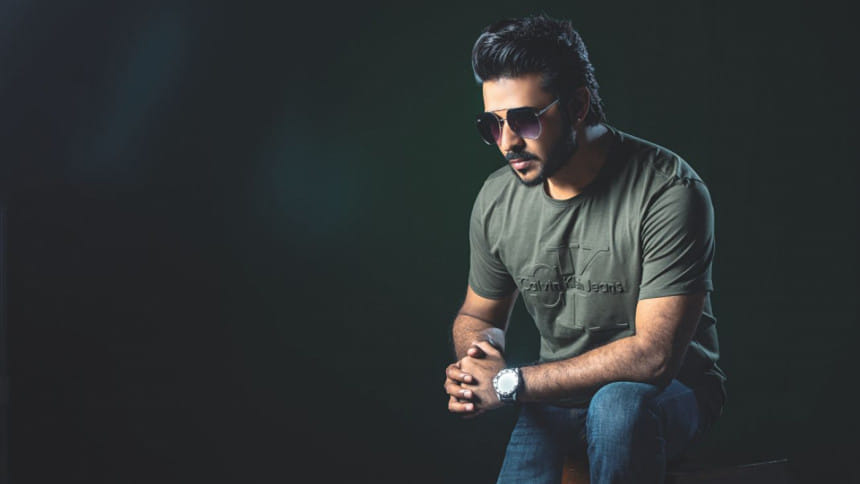The rising hero of Banglasia

Rafi Hossain: Welcome to Uncensored with
Rafi Hossain. Today we have with us actor and model, Nirab Hossain. He has recently starred in a Malaysian film, 'Banglasia', which has gained a lot of popularity. So, tell us about your journey, Nirab.
Nirab Hossain: We began shooting for the film a few years ago. A photography agency named, Apurbo Photography approached me regarding a Malaysian project, where the producers were in search of a Bangladeshi hero to play the role of the protagonist. So, I discussed the details of the project with them, and the only requirement was that I needed to get my visa within five days. So, I asked them to meet me five days later, while my visa was being processed. Meanwhile, the movie's director, Namewee and producer, Fred Chong Kyan Vui explored Bangladesh. So, we met again after I got my visa, and finally discussed the movie in detail. I then learned that the film was based around a Bangladeshi man who was a low-paid worker in Malaysia. He would sometimes work as a chef, a mechanical engineer, or even as a construction worker. The character had also left his mother and his girlfriend in Bangladesh. The script was interesting, but the dialogues were in Malay. I explained that speaking in a different language would prove to be quite difficult for me, but they gave me a script which was translated in English. Moreover, the director was very supportive throughout the whole film, which made it easier for me.
Rafi: Were you the only Bangladeshi actor in the film?
Nirab: Yes, I was the only one. The character of my mother was portrayed by a Tamil actor. Other than that, the whole cast was Malaysian; even the girl who was playing the character of my girlfriend.
Rafi: You have been a part of the film industry for many years now. Did you notice any difference between the Malaysian and the Bangladeshi film industry?
Nirab: There are undoubtedly a lot of differences. Malaysia is a tourist zone, and has people from all over the world. So, they have different sources of entertainment available for people, all throughout the day, and even at night. This includes movie theatres; and they have a variety of foreign films, be it Indian, Chinese or Bangladeshi. Since they have many competitors within the industry, their movies tend to have better planning and content. Another difference I noticed was that they are very selective about their crew. For example, to shoot Banglasia, they brought in a cameraman from Philippines. They also recruited the best stunt performers in Malaysia. Even the makeup team consisted of eleven people. Both the stunt performers and makeup artists had previously worked with Shahrukh Khan. So one can understand how much effort is put into each and every movie that is made. The producers do not make any compromise when it comes to their work.

Rafi: Do you think the Malaysian film industry is more organized, compared to the Bangladeshi film industry?
Nirab: I would not say more organised, but I believe it's about competing within the industry, which leads to the making of better movies. The competition itself is very important; whether the movie will be a success or not comes afterwards.
Rafi: You previously mentioned that there were eleven people in the makeup team. Did the team include costume designers as well?
Nirab: No, the team of eleven was assigned only to do our makeup, and they were very skilled individuals. They had their work divided amongst themselves. Some would fix my hair, while others did my makeup. A few of them were assigned only for the action scenes, and some, only for retouches. Every small detail was perfected.
Rafi: Tell us about the success of 'Banglasia' in comparison to the other movies you have worked in Bangladesh?
Nirab: Banglasia was more evolved in terms of quality, but the same cannot be expected in Bangladesh as the budget for films is usually very low. Moreover, the size of the audience is also quite small, compared to Malaysia. In the case of Banglasia, for example, the movie was released in 116 movie theatres with around 650 shows, on the very first day. It had also earned a total of 220,000 Malaysian ringgit on that day, and had also secured the second position in the list of top ten movies. It has received good reviews.

Rafi: How long did it take to shoot the film?
Nirab: I had to work for forty two days consecutively. Their shooting are done in a unique way. For the first half of the shooting, we worked during the day, for scenes that required daylight. I would wake up at 4 a.m. to get my costume and makeup done, which usually took around two hours. Then, we would shoot from 6 a.m. to 4 p.m. The interesting thing was how they would always send me a text message at exactly 3:59 in the morning, asking me to come downstairs and begin the day's work. For the second half of the shooting, we would start our work during the evening. The shooting would then take place from 7 p.m. and it would end sometime around 6 in the morning. It was an interesting experience. In Bangladesh, we usually work both during the day and night. This leaves little time for preparation, and in the long run, makes the shooting process longer.
Rafi: Since you have worked in a Malaysian film, do you think Bangladeshi directors are more interested in working with you now?
Nirab: I would say that working in a Malaysian film has been an achievement for me. I am truly grateful for all the love that I get, whether it's from Bangladeshis or Malays. But, it is undoubtedly more special when someone from Bangladesh appreciates me. I was truly amazed by the comments that people left on my Facebook and Instagram pages, especially from those who live abroad.
Rafi: I heard that Shakib Khan really admired your work. Is that true?
Nirab: Yes, it is. I'm really thankful to him. He was proud of the work I had done, and he believes that more people should work in such international movies.
Rafi: Do you think more people from the Bangladeshi film industry will be working on projects abroad?
Nirab: I hope they do. The immigrants from Bangladesh do want to watch movies. Banglasia was targeted towards the Malaysian audience. The movie was in Malay, with Malay, Chinese and English subtitles. It was not made for the Bangladeshi audience, and yet so many of them of them watched it, only because I was there. They felt connected to the movie because it featured someone from their own country. They even left beautiful messages on my social media pages. After the movie ended, a Bangladeshi man even came up to me and hugged me, telling me that it was an achievement, not just for me but for the whole country. That really touched my heart.
Rafi: Do you think Bangladeshi producers should focus on making more films internationally?
Nirab: Absolutely. We have people all over the world, who would love to see Bangladesh being represented, even if it's in a movie. Moreover, producers are not likely to incur a loss with such films. It should definitely be encouraged.
Rafi: Nirab, in your opinion, what is the condition of the Bangladeshi film industry right now?
Nirab: When I began my career around 2009, I was told that the industry was not doing well. I have heard similar experiences from senior artists as well. However, I could have established myself by doing television series and dramas, but I am hopeful about the film industry, which is why I chose to be a part of it. The industry is gradually improving; with movies now having better songs and a good storyline.

Rafi: In this age of technology, people are watching films from all over the world. So, there is undoubtedly a lot of competition. Do you think the people working in the film industry are aware of this change?
Nirab: Right now, we are in the middle of a transitional period. A lot of changes are taking place within a short period of time. When the situation becomes stable, I'm sure the industry will be more focused than ever. However, I personally have noticed many people having a negative outlook when a new film is released. Quite often, different directors or actors have rivalry between them. So, they tend to give biased reviews of films. If we want to see the industry thrive, this sort of animosity should be avoided.
Rafi: Nirab, do you have any parting message for our readers?
Nirab: I would request everyone to watch our films. We work very hard to make such amazing movies come to life, and the hard work pays off only when we get positive reviews from our audience. Thank you.
Transcribed by Shreya Shomoyeeta

 For all latest news, follow The Daily Star's Google News channel.
For all latest news, follow The Daily Star's Google News channel. 








Comments